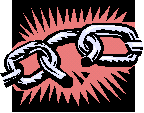Published
by Kathy Paauw
Organizing & Productivity Consultant
Certified Life Coach |
|
August,
2001
Issue 17 |

On
August 15 my husband and I will celebrate our 20th wedding anniversary.
Someone recently asked me what the secret is to staying married to
one person in an age where more than 50% of marriages end in divorce.
I responded by saying that commitment and good communication
have been key. (I also made a really good choice, and my husband is
a prince of a guy!)
Commitments
form the core of our personal and professional relationships with
others. That's why it is so important to behave with integrity and
sincerity when we make commitments to others. Part of the work that
I do as a coach is to help my clients evaluate and refine their commitments
so that they can make and keep them effectively.
Most
of the people I know are over-committed.they've bitten off more than
they can chew! The first week of August is Simplify Your Life Week...a
great opportunity to think about the commitments that matter the most
to you and to let go of those that are not as important. As you reflect
on your personal and professional commitments, ask yourself these
questions:
Why
did I make this commitment?
Your reasons and motives for making commitments change as your family,
career, interests, and skills change. Loyalties shift and resources
vary. This is natural, yet unless you take time to review your commitments
you may continue to show up in places that are no longer a good match
for you.
What
values or priorities am I expressing with this commitment?
It's wise to check and see if you are serving your own values or someone
else's. Language can be key here. If you hear yourself saying, "I
should" or "I gotta" or "I have to" a lot, this is a big red flag.
Check in with yourself and ask, "Do I choose to?"
What exactly have I promised?
Review commitments to see if you know the extent and duration of your
promises. This will help you to keep commitments manageable. When
you make nonspecific commitments, it is easy to expend energy and
attention on a continuing basis without experiencing a sense of completion
or satisfaction. Put some parameters around the commitments you make.
Do I have the resources to keep this commitment?
When you are clear about what you are promising, it will get easier
to tell if you have the resources to keep the promise while tending
to your other responsibilities.
What are you committed to?
When you hear yourself say, "I will try to do this," ask yourself:
Do I choose to DO this? There is no TRY TO. There is only DO or NOT
DO. Make conscious choices around your actions, every moment of every
day. When faced with an obstacle, you can consciously choose to look
at the obstacle and curl up in a psychic ball saying "I can't do it!"
Or you can look at the obstacle, examine it from all sides and say,
"Okay, this side looks pretty ominous, but this part over here.I think
this has possibilities, so I will do this and see what happens." In
other words, although you may not be able to commit to the outcome,
you can commit to your intentions and actions.
Are your commitments
a reflection of your values and talents? Are your commitments helping
you build the relationships you want or are they creating obstacles
to building those relationships?
Give yourself time to reflect on the questions above and then renew
or revise your commitments accordingly.
How often are you out of integrity with what you've committed to
do?
We all have circumstances that come up that make it difficult for us
to honor our commitments to ourselves and to others. When we do not
honor these commitments on a regular basis, we are not living in integrity.
What is integrity? The thesaurus provides these synonyms: honesty, truth,
honor, reliability, uprightness.
Stephen Covey uses a wonderful metaphor to talk about integrity. I share
an excerpt about building an Emotional Bank Account, taken from Covey's
The
Seven Habits of Highly Effective People:
We all know
what a financial bank account is. We make deposits into it and build
up a reserve from which we can make withdrawals when we need to.
An Emotional Bank Account is a metaphor that describes the amount
of trust that's been built up in a relationship. It's the feeling
of safeness you have with another human being.
If I make deposits into an Emotional Bank Account with you through
courtesy, kindness, honesty, and keeping my commitments to you,
I build up a reserve. Your trust toward me becomes higher, and I
can call upon that trust many times if I need to. I can even make
mistakes and that trust level -- that emotional reserve -- will
compensate for it.
But if I have a habit of showing discourtesy, disrespect, cutting
you off, overreacting, ignoring you, becoming arbitrary, betraying
your trust, threatening you, or playing little tin god in your life,
eventually my Emotional Bank Account is overdrawn. The trust level
gets very low. Then what flexibility do I have? None.
Covey describes
six ways to make deposits in an Emotional Bank Account. One of those
six ways is by keeping commitments. Breaking commitments represents
a major withdrawal from an Emotional Bank Account. Another of the six
ways is by demonstrating personal integrity, or conforming our
words to reality.another form of keeping commitments.
|

There's
a new trivia game show on television called "The Weakest Link."
It originated in the United Kingdom. It's a trivia game where contestants
are presented with a question. If answered correctly, the entire
"team" earns money. At any time, the team members can put the money
accumulated by correct answers into a "bank." One incorrect answer
and the team loses all their un-banked money. After each round, the
"team" votes one person -- the weakest link -- off the team. The
grand finale is a playoff between two remaining team members for
the big bundle of money raked in through correct answers and timely
banking.
In
actuality, those who serve as the weakest link in our professional
or personal lives are often the most influential, as they have the
potential to wreak the greatest havoc on our lives. And sometimes
we, ourselves, are the weakest link.
Who
are the weakest links in your life? Who do you know who:
- doesn't
follow through on projects
- does incomplete
or sloppy work that must be done over
- makes commitments
(personal, professional, or to self) and doesn't keep them
- slows everyone
else down by procrastinating
- lacks the
knowledge and/or skill to do what they are supposed to do
- takes on
too many things at once and runs late for everything
- doesn't
work as a team player or pull their own weight
|
Based on your response to these questions you, like the controversial
hostess of this trivia show, may choose to proclaim, "You are the
Weakest Link...Goodbye."
Making
Deposits in Your Emotional Bank Account |

If,
as you answered the questions above, you identified yourself as the
weakest link in some of your relationships with others, you have some
choices. You can continue to drain your Emotional Bank Account, or
you can choose to make deposits. This is easier said than done, as
we are creatures of habit, and habits can be hard to break.
There
are several important steps involved in changing the habits that will
enable you to make deposits in your Emotional Bank Account. I'll share
an example with each step listed below:
- Acknowledge
where you are out of integrity: Several months ago I promised
my colleague that I would complete a project and I have not
honored my commitment.
- Intention:
I choose to complete this project by the end of August.
(Not "I will try to.")
- Committed
plan of action: I've blocked out three hours on Thursday
morning each week to work on this project between now and
the end of August. During these scheduled working sessions I will
let my voice mail take messages and I will close my door and ask
that I not be interrupted.
- Action:
I exercise integrity and follow through with my plan, without
allowing myself to get derailed by distractions. If an emergency
comes up that derails me from my work, I reschedule the working
session for another time that week
- Accountability:
I share my intentions with someone else and ask him/her
to check with me weekly to see if I did what I said I would
do.
|
One
of the best ways I have found to build in accountability for myself
around keeping commitments, is to work
with a personal coach. I have had my own personal coach for several
years. My coach holds me accountable to my commitments (to myself
and others) without judging me. This is one of the most powerful elements
of the coaching relationship. I am far more likely to follow through
with my commitments and action plans when I know that my coach will
ask me next week how it went! If things did not go as planned, I have
an opportunity to reflect on it and identify what got in the way so
I can try something different the following week.
|
|
One of my clients sent this to me, and I thought you should be aware
of this very serious condition, which may have a tremendous impact
on your ability to keep commitments to yourself and others.
I'm writing you
to let you know that I have recently been diagnosed with a very serious
condition and there's no hope I will ever get over it. Some of your
other clients may have it also. Check out the symptoms. It may be
hereditary as well. The scientific world is frantically searching
for a cure. This is an ailment many of us suffer from and may not
as yet have been diagnosed. However, once your clients are aware of
this, they may be able to discuss it with their loved ones and try
to explain what really happened to them all those times they tried
so hard to accomplish something and didn't.
It's called the
"Butfirst Syndrome."
It's like when
I decide to do the laundry.I start down the hall and notice the newspaper
on the table. Okay, I'm going to do the laundry, Butfirst I'm going
to read the paper. Then I notice the mail on the table. Okay, I'll
just put the newspaper in the recycle stack, Butfirst I'll look through
that pile of mail and see if there are any bills to be paid. Now where's
the checkbook? Oops! There's the empty glass from yesterday on the
coffee table. I'm going to look for that checkbook, Butfirst I need
to put the glass in the dishwasher. I head for the kitchen, look out
the window notice my poor flowers need a drink of water. I put the
glass on the counter, and darn it, there's the remote for the TV on
the kitchen counter. What's it doing here? I'll just put it away.
Butfirst I need to water those plants. I head for door and.Aaaack!...step
on the cat. The cat needs to be fed. Okay, I'll put that remote away
and water the plants. Butfirst I need to feed the cat. At the end
of day: The laundry isn't done, the newspapers are still on the floor,
the glass is still not in the dishwasher, the bills are not paid,
the checkbook is still missing, and the cat whizzed on the remote
control. AND, when I try to figure out why nothing got done all day,
I'm baffled, because I KNOW I WAS BUSY ALL DAY!
I realize this
condition is serious....and should get help...But first I think I'll
read all my e-mail.
|
|
Special
Offer
 |
If you're
interested in living a life that's different than the one
you're living now, working with a coach might be just what
you need to move you forward in the direction you want to
go. Contact me and we'll set up a time to talk. The first
call is free and you are under no obligation to continue.
After that, you can decide if coaching is what you really
need, and if I am the right coach for you. If I am, we can
talk about what our working together will look like. If
I'm not, I'll refer you to a trusted colleague who might
be a better fit.
We get
what we settle for. It's never too late -- or too early
-- to settle for more. When you are ready to settle for
more -- professionally or personally -- click here
to request your complimentary sample coaching session.
Click
here
to see what my clients have to say about coaching with me.
Read
the December 2000 Working
Woman magazine article about Kathy and her client.
Click
here
to view Q&A about coaching.
|
|
Get my FREE Organizational Assessment
tool.
Click here to
contact me and arrange for your complimentary consultation.
Calculate
what disorganization costs you or your company.
Executives,
CEOs, and Managers:
Read about our Paper Tiger Productivity
QuickStart™ program.
Declutter
your environment by donating items you no longer need -- an old computer,
cell phone, children's shoes and coats, clothing and household items,
or even a car -- and get a valuable tax deduction in the process. Click
here for more information.
Our
Mission
I help individuals committed to moving their lives forward in powerful ways
by decluttering their schedules, spaces, and minds.
Table
of Contents for Past Issues
Paauwer
Tools is a free monthly newsletter.
To subscribe to
this newsletter click here.
We appreciate your forwarding
this to your friends and colleagues you think might benefit
from reading it. Your recommendation is how we grow.
Anyone can subscribe. We request that you keep the broadcast
intact, including the contact and copyright information.
You
are free to use the material from my articles in whole
or in part on your web site or ezine (email newsletter)
as long as you include the attribution below and also
let me know where the article will appear.
This
article is by Kathy Paauw of Paauwerfully Organized.
Kathy's web site is a comprehensive resource
devoted to helping busy professionals and small
business owners de-clutter their schedules, spaces,
and minds so they can focus on what's most important. Kathy
is an organizing & productivity consultant,
certified business & personal coach, and
speaker. Visit her website for free resources and valuable productivity
tools visit http://www.orgcoach.net . |
Send your comments, questions,
and suggestions for future newsletter content to me.
I'd love to hear your thoughts!
Warm regards,
Kathy Paauw, Paauwerfully
Organized
425-881-6627 |

|


